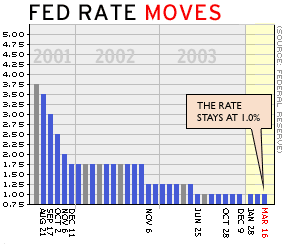NEW YORK (CNN/Money) - Economists will be shocked if the Federal Reserve were to change interest rates Tuesday, but most are convinced the central bank's policy makers will do so soon.
The Fed's Open Market Committee meeting Tuesday is its first since recent economic reports showed the highest jobs expansion and inflationary pressure in several years.
But even with rates near four-decade lows, economists believe it's too soon to expect the Fed to shake up the market with a sudden rate hike, which would be its first since May 2000.
"I'd say there's only a 25 percent chance of a rate hike in June even," said Bill Cheney, chief economist for MFC Global Investment Management. "Even with another strong jobs report Friday, they'll want to have something that looks more definitely like a trend."
It's all in the words
So the focus will again fall to the language of the statement the FOMC will release when the meeting ends, namely the part that said the Fed's not ready to raise rates:

"With inflation quite low and resource use slack, the committee believes that it can be patient in removing its policy accommodation," said the FOMC's March statement.
Economists said they would be surprised if the word "patient" is still found in Tuesday's statement.
"We believe it is time for the Fed to drop the sentence," said a note from economists at Lehman Brothers. "Until August last year, the Fed had never included a longer-term commitment about policy in its directive and, with the economy finally showing clear signs of normalization, it is time for a more normal directive."
Lehman's economists believe there will be a short-term negative reaction in the bond and equity markets to the loss of the word "patience," while others, such as Cheney, believe the markets have already priced in the absence of "patience."
What about inflation?
The other key language question is what the Fed will say about the risk of inflation.
In March it said, "The probability of an unwelcome fall in inflation has diminished in recent months and now appears almost equal to that of a rise in inflation."
Some say that after Fed Chairman Alan Greenspan's statement to Congress last month that he no longer saw a risk of deflation, the Fed will express a "neutral" bias on inflation this month, to be followed in June by a statement that says the risk of inflation is now greater than that of stagnant or falling prices.
This so-called "bias" of the Fed is used by the central bank to indicate which way it is leaning on interest rates -- a negative bias would mean the Fed is more inclined to cut the fed funds rate, a neutral one suggests the FOMC will stay pat for a while, and a positive bias is seen as an indication the Fed is ready to hike.
"If they don't move to a neutral position, the bond market will react negatively," said John Silvia, chief economist at Wachovia Securities. "If the Fed sits there and reiterates the same risk on inflation, the bond market is going to look at this and say the Fed is way behind the curve."
Cheney noted that if the Fed says Tuesday it now sees a positive risk of inflation -- thus shifting from a negative bias straight to a positive one, without a period of neutrality -- it could shake up the market as well. Right now, the Wall Streeters are in the belief that the Fed won't raise rates at least until its August meeting.
"If they're a little more outspoken on how strong the economy is and the signs of inflation, that could spook the market into believing they'll move at June meet," he said.
But both Cheney and Silvia think the makeup of the FOMC makes such a shift in language unlikely in Tuesday's statement. Therefore they think the key event for markets this week is Friday's April employment report, not Tuesday's Fed meeting.
"They (the Fed governors) are going to follow the jobs report. They're not going to be proactive. They're going to be reactive to the data," said Silvia.

|